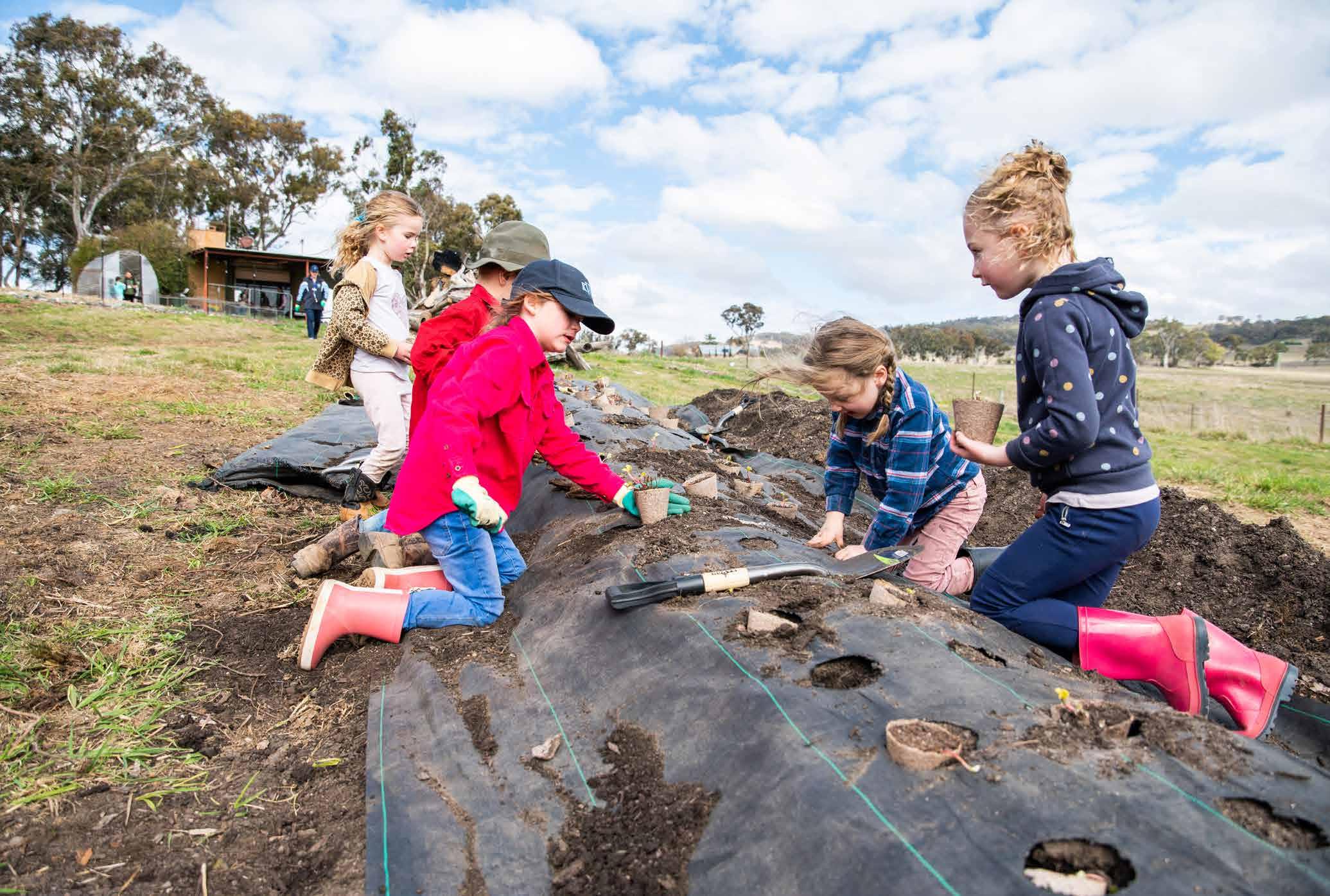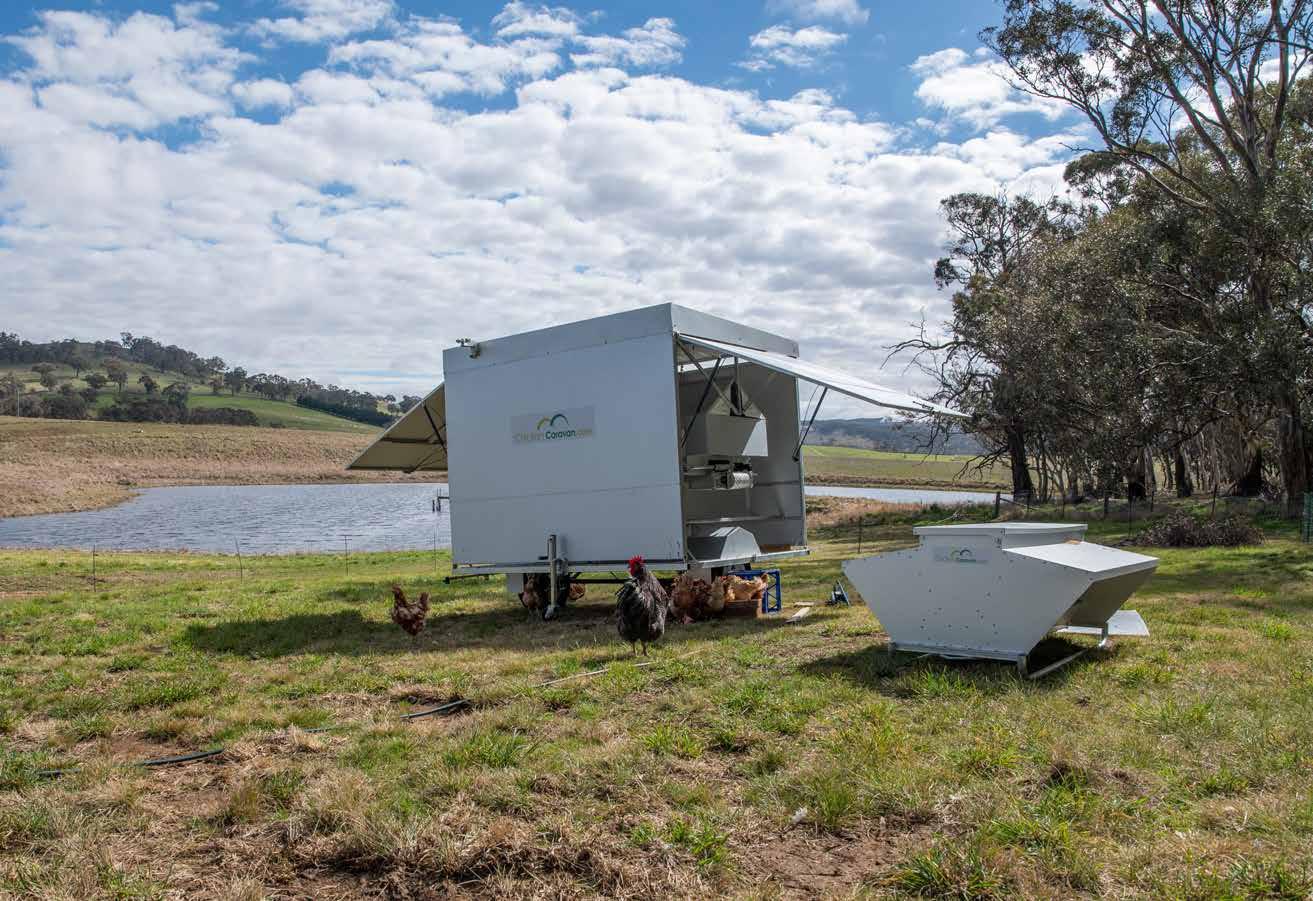
6 minute read
Learning at Windermere Farm
- Sue-Ann Gavin, Director of TREE (The Regional Engagement Enterprise)
Windermere Farm invites Kinross Wolaroi School students to learn through practical experience. This gives students real-life application of the theories they learn in the classroom, and students are more likely to recall their learning experience if they have actively participated in the learning process.
There was a real buzz of activity at Windermere in 2021, with the Junior School visiting the farm weekly or fortnightly and the Senior School utilising the farm for contextualised learning tasks.
In the Junior School, PreKindergarten students fed pigs, climbed trees and dug for insects, while Kindergarten students celebrated their first 100 days by planting 100 strawberry plants. The rest of the Junior School was involved with a wide range of farm operations, from shearing to lamb and cattle marking and tagging, fencing and mowing.
In the Senior School, Year 7 to 10 Visual Arts students had the opportunity to paint, photograph and draw the farm, while Year 8 Geography students completed water and soil tests to monitor the farm’s health. Year 9 and 10 Agriculture students designed and measured the dam capacity to improve the health of silver perch fingerlings, while Year 10 Science students tracked the genetic activity of ewes.
Year 11 Business Studies students completed a case study on Windermere and were able to use it as an example for their assessment task on operations, making suggestions on how to improve the farm layout and efficiencies. Year 11 Biology students undertook a biodiversity audit of the farm, while Year 11 Hospitality students took part in a series of outdoor cooking workshops using farm produce.
History students made use of the archaeological dig site to find buried treasures from years gone by, while Year 7 PDHPE (Personal Development, Health and Physical Education) students raised and planted vegetables that will be used as part of their good nutrition and Paddock to Plate unit.
Finally, the School’s cattle were rehomed to the beautiful, new cattle yards built at Windermere.
Director of TREE (The Regional Engagement Enterprise), Sue-Ann Gavin, said engaging students in real-life experiences creates life-long learners.
“Our Windermere campus gets students excited about learning new things and having the opportunity to connect the learning in one subject to a much broader spectrum. They are not learning in isolation, rather across all curriculum areas, building a much stronger foundation of learning,” she said.
“The fact they can understand the importance of purchasing food locally to reduce food miles and then come out to Windermere and create a meal that has been completely grown and bred here is very special. They are applying their newly-acquired knowledge to life and encouraging others to do the same. Learning at Windermere makes learning fun and enjoyable.”
KWS values are also applied at Windermere, with students developing Courage as they step outside their comfort zone; Respect for the land and animals; Inclusiveness in new opportunities; Resilience when things don’t go to plan and a Commitment to planning, building and creating. 2021 was the perfect opportunity for this, with COVID-19 encouraging staff to embrace more opportunities for learning outside the confines of a conventional classroom setting.

Events such as Science Week were also celebrated as a way for students to get stuck into life on the farm. The 2021 theme, Different by Design, was linked to the United Nations Year of Fruits and Vegetables, which meant some of the scientific discoveries, inquiries, activities and themes examined fruit, vegetables, tea and food waste. Kindergarten students made healthy fruit skewers, Year 1 students tasted freshly-harvested honey from Windermere’s flow hive, Year 3 students enjoyed roasted potatoes on the campfire and made their own butter, and Year 6 students used locallyprocessed meat from Windermere to make their own sausages.
Mrs Gavin said the increased trips to Windermere were extremely rewarding for staff and students.
“Students were able to understand concepts that are usually taught through text and images in a real-world context. They quickly made connections between new content and their understanding of the world. In addition, they worked collaboratively to solve problems and make new discoveries. This contextual approach to education allows students to learn across key learning areas simultaneously, creating an authentic and meaningful approach to learning,” she said.
Windermere has also been the perfect space to support student wellbeing, which was vital during such a challenging year.
“From structured leadership workshops to exercise and gardening, Windermere has been a transformative learning space and source of enjoyment and relaxation for students,” Mrs Gavin said.
“This year, a Junior School TWIG team was established, which meant interested Year 5 and 6 students could meet weekly at the farm to further their interest in cooking and agriculture. Students enjoyed campfire cooking, harvesting honey, making soap from local ingredients, building irrigation systems and initiating a new market garden.”
Needless to say, there are endless opportunities for growth at Windermere and next year looks set to be bigger and busier.
“Following the success of our Term 4 ‘Windermere - where learning comes alive’ initiative, all Junior School students will have a fortnightly timetabled class at Windermere. This will once again become a curriculumdriven, contextual-learning experience that builds on what they have learnt and experienced this year,” Mrs Gavin said.
“Our PDHPE students will also have timetabled classes at Windermere to experience the mountain bike, frisbee golf and spartan challenge courses. Hopefully, our silver perch will be joined by some brown trout and we can include some fishing activities for our students. Weekend campouts for our boarders and community workshops are planned for 2022. We will also be having our first Windermere Open Day. The growth of the market garden should see us generate enough food to feed the boarders on a regular basis. We are also on the lookout for a couple of milking goats to further enhance the learning opportunities for our students.”
- Sue-Ann Gavin, Director of TREE













